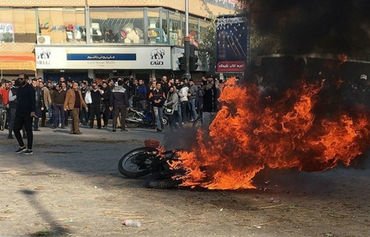Iran's Islamic Revolutionary Guard Corps (IRGC) is exploiting the novel coronavirus (COVID-19) pandemic to expand its influence in the region and inflame sectarian tensions, Iranian affairs experts told Al-Mashareq.
The IRGC has been stirring up trouble by promoting patently false conspiracy theories about the origins of the virus, and fanning sectarian tensions over the necessary closure of religious sites, especially those in Saudi Arabia, they said.
Fanning the flames of sectarian conflict has been part of the IRGC's modus operandi since the current regime came to power, Tehran native Hossein Shayan told Al-Mashareq.
Now IRGC commanders in Iran and the leaders of affiliated militias in the region have been propagating a new conspiracy theory regarding the coronavirus, "implying that Western countries, particularly the US, are behind it", he said.
Mohammed al-Houthi, president of the Houthis' so-called Supreme Revolutionary Committee, has parroted this baseless conspiracy theory, he said, and also has described the closure of religious sites in Saudi Arabia as a "most heinous sin".
This was a flagrant attempt to "ignite sectarian and religious tension", he said.
Disinformation campaign
In Lebanon, Hizbullah chief Hassan Nasrallah has been "furthering this disinformation campaign, and at the same time continuing his incitement against some Arab countries, especially the UAE and Saudi Arabia", Shayan said.
"Instead of focusing attention on deteriorating internal affairs, especially the health situation, IRGC Quds Force commander Gen. Esmail Qaani visited Iraq and Syria and met with the leaders of his affiliates," Shayan said.
Qaani was in Baghdad March 30th where he reportedly met with top Iraqi officials to relay Iran's rejection of Adnan al-Zurfi's nomination to the post of prime minister.
Al-Zurfi has since ended his bid to form a government, but from the time news of his nomination was released, media close to the IRGC mobilised to destroy him, accusing him of being a close ally of the US and an enemy of Iran's interference in Iraq.
Qaani made these visits "without regard to the risks associated with the gathering of large crowds that such visits attract and the tense situation, especially in Iraq", he said.
This insistence on visiting regional proxies, even amid the current health crisis, indicates "that IRGC leaders care about nothing other than the interests of expanding [their reach] in the region and exploiting every opportunity", he said.
No cessation of hostilities
In Yemen, the Iran-backed Houthis (Ansarallah) have taken advantage of the global preoccupation with the coronavirus pandemic to launch missiles at Saudi Arabia, military expert Wael Abdul-Muttalib told Al-Mashareq.
The militia has even carried out several attacks on sites inside Saudi territory near the border with Yemen, he said.
The Houthis have taken advantage of the Arab coalition's agreement to a ceasefire to continue targeting Saudi cities and maritime navigation, observers said.
This means Iranian weapons continue to flow to Yemen to serve Iran's goals and its expansionist plan in the region, they said.
Abdul-Muttalib also said he does not rule out the possibility that Iran-backed militias in Iraq and Syria might launch a "massive redeployment", taking advantage of the situation to expand into new areas.
Precursors of this plan are already beginning to appear on the ground, he said, "as they are publicising the launch of fake military campaigns based on unfounded claims pertaining to the re-emergence of the 'Islamic State of Iraq and Syria' (ISIS)".
Stirring tensions in the region
"The IRGC did not wait long before starting to exploit the coronavirus pandemic crisis to [...] stir tension with the countries of the region," said al-Sharq Centre for Regional and Strategic Studies Iranian affairs researcher Fathi al-Sayed.
Iranian media outlets have meanwhile seized on the plight of Bahraini citizens temporarily stranded in Iran to claim that Bahrain does not care about its people and has abandoned them amid the coronavirus pandemic, he told Al-Mashareq.
Most had travelled to Iran for religious visits via a second country, though some apparently had not disclosed that their ultimate destination was Iran, he said.
"Iran and its media are claiming that the appeals these Bahraini citizens made to their government are falling on deaf ears," he said.
The Bahraini authorities did not hesitate to provide assistance to their citizens abroad, he said, and have already begun evacuating them.
Bahrain also has allocated daily allowances to help them with their expenses while they await transportation home, he added.

![One of the missiles launched into Saudi territory by the Houthis at the end of March. The missile was intercepted and its debris fell to the ground, without causing any damage. [Photo courtesy of Saudi Press Agency]](/cnmi_am/images/2020/04/10/23400-Houthi-intercepted-missile-600_384.jpg)






